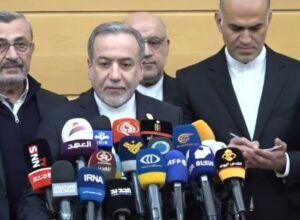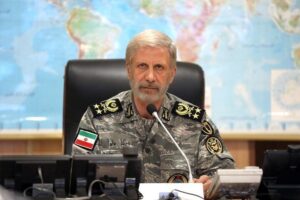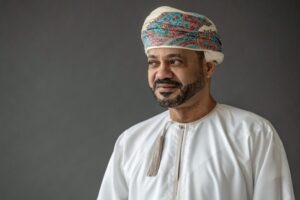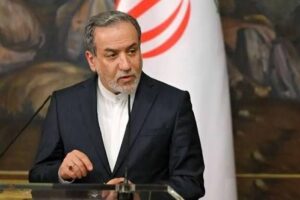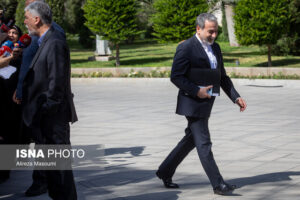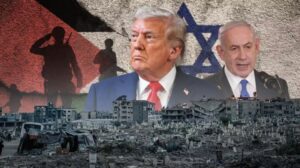Future of talks with US under review
Araghchi also touched on the potential of resuming talks with the United States, which were abruptly shelved following the Israeli aggression on June 13.
The aggression came two days before the sixth round of talks was scheduled in Muscat.
“Whether we will specifically return to talks with the United States is under review and depends on our national interests,” he asserted.
Even before the Israeli aggression, the Americans had been mounting pressure on Iran based on false accusations of Iran pursuing a nuclear weapons program.
However, Araghchi asserted that there is no talk of negotiations at the moment, noting that the words of the US president must not be taken too seriously.
Support for Iran shows country’s rising stature
Araghchi said the fact that so many countries and international organizations came forward to express their support for Iran during the Israeli-imposed war shows the rising clout of the country internationally.
He cited some of the bodies in question as the Organization of Islamic Cooperation (OIC), which groups 57 Muslim-majority countries, the Persian Gulf Cooperation Council, a regional alliance, the Shanghai Cooperation Organization (SCO), a political, economic, and security alliance that includes China and Russia, and the BRICS group of emerging economies.
“Support for Iran in this war translates into our having entered a global arena to prove the rightfulness of the Iranian people, our positions and principles, and to garner international backing,” the top diplomat stated.
Iran’s policy is to expand good neighborly relations
On Iran’s missile strikes at a US base in Qatar, in response to US airstrikes on three nuclear sites, Iran’s foreign minister said the message was directed at the United States, not Arab countries, including Qatar.
Even before the attack, during the meeting of the foreign ministers of Islamic countries, Araghchi said he met with all six ministers and remained in contact with them.
“I clearly explained to them that if the United States attacks us, while our missiles may not yet reach American soil, they can reach nearby US bases. And we would have no choice but to retaliate against those bases, which, unfortunately, are located in your countries,” he said, quoting the message he communicated to his Arab counterparts.
He said the only message Iran wants to send to its neighboring countries is the message of friendship, good relations, and neighborliness.
“When the attack took place, the Qataris were understandably upset. The Persian Gulf Cooperation Council (GCC) countries were also displeased. But we had already clarified that our issue is with the Americans, not with them,” he noted.
“The very next day, an emergency PGCC foreign ministers’ meeting was held in Doha to express solidarity with Qatar. I contacted each of the six GCC foreign ministers and said: ‘Include my name under the statement of solidarity with Qatar. We also stand in solidarity with Qatar and support it.’ But the issue of US bases is completely separate.”
He said Iran had documented evidence that these bases are used by the US against Iran, in support of the Israeli regime, without the knowledge of their hosts.
“I firmly emphasize that our policy is to expand good neighborly relations, especially with the Persian Gulf Cooperation Council, across the entire Persian Gulf region, with Iraq, and even beyond,” he asserted.
War and its result proved the epic of Iranian invincibility
Referring to the Israeli aggression against Iran, Araghchi said these 12 days will be recorded in history as “a symbol of a nation’s resistance against a coalition of powers backing the Zionist regime.”
He underscored how the Islamic Republic was targeted during this period by the two nuclear-armed parties, namely the Zionist regime and the United States, who entered the war by attacking Iran’s peaceful sites.
He also noted how the war efforts were supported by European countries.
“They all mobilized to break the Islamic Republic down and force it to surrender in order to end a nearly-50-year fight against American imperialism, but failed,” he said.
The Iranian people joining ranks towards fighting off this aggression “proved Iran’s and Iranians’ invincibility to the world, and put our [power of] resistance on display.”
The top diplomat said the aggressors resorted to direct war after decades of deploying various instruments of pressure against the Iranian nation, including threats and sanctions.
Guiding principle in Iran’s foreign policy is interests of people
Araghchi said the aggression unleashed by the Israeli regime, as well as the US, which is a permanent member of the United States, represents a blow to the credibility of the NPT.
“It goes beyond just discrediting the NPT, it undermines the entire non-proliferation regime, a system that has been years in the making, through disarmament conferences, the United Nations, and other institutions, to supposedly make the world safer,” he noted.
The non-proliferation regime, he said, stipulates that nuclear-armed states must move toward disarmament, while non-nuclear states commit not to pursue weapons, in exchange for access to the peaceful use of nuclear energy.
“That is the essence of the NPT. But in practice, nuclear-armed states have not only failed to disarm, they have expanded and enhanced their arsenals. Meanwhile, non-nuclear states that pledged not to pursue weapons have faced increasing restrictions on their peaceful programs, restrictions not even mentioned in the NPT.”
He said the Western powers have spent years weakening the NPT themselves.
“Our decisions are based on the national interest. What matters above all to us is the supreme interest of the country and the Iranian people. Whether that interest leads us in one direction or another in order to secure the people’s rights—that is what will guide our choices,” he added.
“Whether we remain in the NPT, withdraw from it, or pursue another course, it must be based on a careful assessment of the nation’s interests. Whatever these interests require, we will act accordingly. In diplomacy and foreign policy, nothing is sacred or absolute. There is no ‘must’ or ‘must not’—the only criterion is the national interest of the Islamic Republic of Iran and its people.”
Resorting to snapback a historical mistake
Araghchi also addressed the United Kingdom, France, and Germany’s attempts to invoke the so-called “snapback” mechanism that would enable the return of the United Nations sanctions against Iran, which were suspended under a 2015 nuclear deal, also known as the Joint Comprehensive Plan of Action (JCPOA).
“Europe’s greatest historical mistake would be to invoke this mechanism,” he said. “Because by doing so, it (Europe) would permanently end its role in the Iranian nuclear issue.”
Just as the United States has complicated the future of talks with Iran by attacking the Islamic Republic, the European parties, too, would be obstructing any potential diplomatic engagement by resorting to the mechanism, the top diplomat noted.
UN nuclear chief not welcome in Iran for now
Araghchi further said the Islamic Republic has decided not to allow Rafael Grossi, director-general of the International Atomic Energy Agency (IAEA), inside the country for now.
He cited the bill passed by the parliament, which was endorsed on Thursday by the Constitutional Council, ordering immediate suspension of cooperation with the UN nuclear watchdog owing to its recent politically-motivated resolution against the country that had falsely accused Tehran of “non-compliance” with the agency.
The resolution, pushed by the European troika and endorsed by the US, came a day before the Israeli regime launched its aggression against Iran.
According to insiders, the regime felt emboldened by the report and the resolution to carry out its unprovoked and unjustified aggression against a member of the Nuclear Non-Proliferation Treaty (NPT) signatory.
Pursuing UN recognition of aggressor and reparations for damages
Araghchi informed that the international affairs department of the foreign ministry has been assigned to pursue the issue of identifying the aggressor at the United Nations, as well as to follow up on securing reparations for the damages incurred in Israeli-American aggression.
The legal affairs department in the presidential office has also begun working on this matter, he added, noting that a key prerequisite for this effort is compiling a detailed assessment and documentation of the damage in order to determine the full extent of both human and material losses inflicted.
“This process requires an intensive effort to accurately document all damages and costs. The pursuit of compensation itself will be a highly complex and demanding legal undertaking. As I mentioned, this issue was specifically emphasized today by the Leader of the Islamic Revolution,” Araghchi remarked.
Earlier, Saeed Khatibzadeh, Iran’s deputy foreign minister, also said the ministry was pursuing the case of reparations for damages caused by the Israeli-American aggression.

